|
|
Published September 25th, 2024
|
Digging Deep with Goddess Gardener, Cynthia Brian
|
| Dear Deer! |
| By Cynthia Brian |
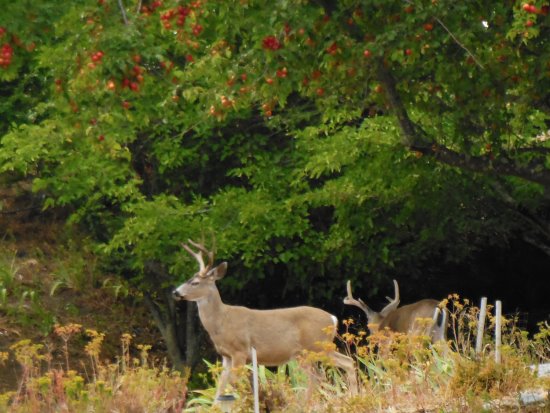 |
| Bucks in the orchard. Photos Cynthia Brian |
"We are part of the earth, and it is part of us. the deer, the horse, the great eagle: these are our brothers." - Chief Seattle.
 Now that fall has arrived, foraging deer have become a nuisance in suburban gardens. The Columbian Blacktail was abundant during the 18th century in California. The population plummeted after the Goldrush due to over-hunting for venison and rawhide. The Department of Fish and Game speculates that between 1900-1910, fewer than 300,000 deer of all species roamed the state. In 1907, deer hunting was regulated, resulting in deer residents soaring to over a million by the 1940s. The decline of the horned herbivores began when fire suppression increased, agricultural plots swelled, and wildlands became suburban developments. Yet, the dear deer acclimated to their new environment and today claim our gardens as their favorite restaurants.
Now that fall has arrived, foraging deer have become a nuisance in suburban gardens. The Columbian Blacktail was abundant during the 18th century in California. The population plummeted after the Goldrush due to over-hunting for venison and rawhide. The Department of Fish and Game speculates that between 1900-1910, fewer than 300,000 deer of all species roamed the state. In 1907, deer hunting was regulated, resulting in deer residents soaring to over a million by the 1940s. The decline of the horned herbivores began when fire suppression increased, agricultural plots swelled, and wildlands became suburban developments. Yet, the dear deer acclimated to their new environment and today claim our gardens as their favorite restaurants.
 As I've been busy with garden consultations this past month, the issue of deer damage continues to be a major concern. The hills are dry, edible resources have diminished, and the most inviting source of delectable treats grows in our private landscapes. Oh deer!
As I've been busy with garden consultations this past month, the issue of deer damage continues to be a major concern. The hills are dry, edible resources have diminished, and the most inviting source of delectable treats grows in our private landscapes. Oh deer!
 As a child, I remember going out into the orchards and vineyards on our farm at dusk every September evening to scare the herds as they could easily devour a year's harvest. All the methods we tried didn't work until we built fences surrounding the property.
As a child, I remember going out into the orchards and vineyards on our farm at dusk every September evening to scare the herds as they could easily devour a year's harvest. All the methods we tried didn't work until we built fences surrounding the property.
 I have always admired these beautiful, gentle creatures, and I enjoy watching the big bucks in the hills, sometimes sparring. In the spring when the mothers show their fawns where the newly sprouted green weeds are growing, I am doubly delighted. As much as I enjoy these wild, peaceful prowlers, like all gardeners, I don't want them devouring my plants.
I have always admired these beautiful, gentle creatures, and I enjoy watching the big bucks in the hills, sometimes sparring. In the spring when the mothers show their fawns where the newly sprouted green weeds are growing, I am doubly delighted. As much as I enjoy these wild, peaceful prowlers, like all gardeners, I don't want them devouring my plants.
 It is essential to be clear. There is NO DEER-PROOF plant. If the animal is hungry enough, it will eat anything. The only deer-proof garden is a fenced garden. In this article, I'll share a few strategies for you to attempt. However, I reiterate, that the only foolproof method is to fence your yard. Since most people don't fence their front gardens, I am including a list of plants that deer relish munching and a list of plants they prefer not to consume, although they'll eat the new, tender shoots of most. Keep this handy list as a reference as you plan to plant.
It is essential to be clear. There is NO DEER-PROOF plant. If the animal is hungry enough, it will eat anything. The only deer-proof garden is a fenced garden. In this article, I'll share a few strategies for you to attempt. However, I reiterate, that the only foolproof method is to fence your yard. Since most people don't fence their front gardens, I am including a list of plants that deer relish munching and a list of plants they prefer not to consume, although they'll eat the new, tender shoots of most. Keep this handy list as a reference as you plan to plant.
 What plants are deer attracted to?
What plants are deer attracted to?
 Deer enjoy sweet, soft, delicate plants that won't annoy their tongues or their sensitive palates.
Deer enjoy sweet, soft, delicate plants that won't annoy their tongues or their sensitive palates.
 If you want to offer deer a bountiful buffet, these are a few of the plants they gravitate to:
If you want to offer deer a bountiful buffet, these are a few of the plants they gravitate to:
 Agapanthus
Agapanthus
 Pansies
Pansies
 Daylilies
Daylilies
 Hosta
Hosta
 Violas
Violas
 Violets
Violets
 Dahlia
Dahlia
 Tulips
Tulips
 Sunflower
Sunflower
 Crocus
Crocus
 Gerbera
Gerbera
 Hydrangea
Hydrangea
 Rhododendron
Rhododendron
 Azalea
Azalea
 Hibiscus
Hibiscus
 Clematis
Clematis
 Hollyhock
Hollyhock
 Morning glory
Morning glory
 Blackberries
Blackberries
 English ivy
English ivy
 Grape vines
Grape vines
 Kiwi
Kiwi
 Peas
Peas
 Greens (lettuce, spinach, chard)
Greens (lettuce, spinach, chard)
 Beans
Beans
 Cabbage
Cabbage
 Broccoli
Broccoli
 Beets
Beets
 Carrot tops
Carrot tops
 Corn
Corn
 Deer-Resistant Species
Deer-Resistant Species
 In general, marauding stags and does stays away from strong-smelling, bitter-tasting, fuzzy, leathery, spiny, toxic, and fibrous foliage. They will eat these as a last resort because no flower or leaf is deer-proof. They innately know what plants are poisonous. If you want to deter deer from dining chez vous, try planting the selections below.
In general, marauding stags and does stays away from strong-smelling, bitter-tasting, fuzzy, leathery, spiny, toxic, and fibrous foliage. They will eat these as a last resort because no flower or leaf is deer-proof. They innately know what plants are poisonous. If you want to deter deer from dining chez vous, try planting the selections below.
 Natives:
Natives:
 Yarrow
Yarrow
 Manzanita
Manzanita
 Sage (salvias)
Sage (salvias)
 Pot marigolds
Pot marigolds
 California poppies
California poppies
 Milkweed
Milkweed
 Ferns
Ferns
 California Fuchsia
California Fuchsia
 Deer Grass
Deer Grass
 Pink flowering currant
Pink flowering currant
 Elderberry
Elderberry
 Blue-eyed grass
Blue-eyed grass
 California lilac (ceanothus)
California lilac (ceanothus)
 Grevillea (peaches and cream)
Grevillea (peaches and cream)
 Muhly grass
Muhly grass
 Jerusalem sage
Jerusalem sage
 Other Perennial Plants:
Other Perennial Plants:
 Bee Balm
Bee Balm
 Lavender
Lavender
 Catmint
Catmint
 Society Garlic
Society Garlic
 Ornamental onion
Ornamental onion
 Echinacea
Echinacea
 Hardy Geranium
Hardy Geranium
 Pinks
Pinks
 Astilbe
Astilbe
 Red hot poker
Red hot poker
 Peony
Peony
 Dusty Miller
Dusty Miller
 Lambs ear
Lambs ear
 Hellebore
Hellebore
 Penstemon
Penstemon
 Digitalis (Foxglove)
Digitalis (Foxglove)
 Sea Foam Statice
Sea Foam Statice
 Ferns
Ferns
 Coral Bells (Heuchera)
Coral Bells (Heuchera)
 Coreopsis (Tickseed)
Coreopsis (Tickseed)
 Russian Sage
Russian Sage
 Sea Holly
Sea Holly
 Nigella
Nigella
 Nasturtiums
Nasturtiums
 Kangaroo Paw
Kangaroo Paw
 Cosmos
Cosmos
 Rudbeckia
Rudbeckia
 Lantana
Lantana
 Gaillardia (Blanket flower)
Gaillardia (Blanket flower)
 Camellia
Camellia
 Sweet Alyssum
Sweet Alyssum
 Dicentra (Bleeding Heart)
Dicentra (Bleeding Heart)
 Primrose
Primrose
 Bulbs:
Bulbs:
 Crocosmia
Crocosmia
 Wild leeks
Wild leeks
 Daffodils
Daffodils
 Iris
Iris
 Allium
Allium
 Dutch iris
Dutch iris
 Crocus
Crocus
 Woodland hyacinth
Woodland hyacinth
 Naked Ladies
Naked Ladies
 Anemone
Anemone
 Annuals:
Annuals:
 Verbena
Verbena
 Snapdragon
Snapdragon
 Marigold
Marigold
 Bachelor Buttons
Bachelor Buttons
 Calendula
Calendula
 Annual Vinca
Annual Vinca
 Lobelia
Lobelia
 Larkspur
Larkspur
 Tobacco
Tobacco
 Stock
Stock
 Strawflower
Strawflower
 Mexican Sunflower
Mexican Sunflower
 Zinnia
Zinnia
 Nasturtium
Nasturtium
 Bushes:
Bushes:
 Boxwood
Boxwood
 Butterfly Bush
Butterfly Bush
 Viburnum
Viburnum
 Deutzia
Deutzia
 Rose of Sharon
Rose of Sharon
 Daphne
Daphne
 Lilac
Lilac
 Weigela
Weigela
 Chinese Fringe flowers
Chinese Fringe flowers
 Barberry
Barberry
 Russian Sage
Russian Sage
 Silky Dogwood
Silky Dogwood
 Vines:
Vines:
 Passionflower
Passionflower
 Pink Bower Vine
Pink Bower Vine
 Other Grasses: (many grasses are not recommended due to being fire-prone)
Other Grasses: (many grasses are not recommended due to being fire-prone)
 Lomandra grass
Lomandra grass
 Mexican Feather grass
Mexican Feather grass
 Zebra grass
Zebra grass
 Fountain grass
Fountain grass
 New Zealand flax
New Zealand flax
 Egyptian Papyrus
Egyptian Papyrus
 Mondo grass
Mondo grass
 Blue Oat grass
Blue Oat grass
 Deer Deterrents
Deer Deterrents
 Many people have experimented with deer deterrents. Other than allowing your dogs to roam the perimeter, installing fencing around the area, or putting wire around every single plant, I have not found that any of these worked. Give any a try and let me know if you are successful.
Many people have experimented with deer deterrents. Other than allowing your dogs to roam the perimeter, installing fencing around the area, or putting wire around every single plant, I have not found that any of these worked. Give any a try and let me know if you are successful.
 1. Sprays that include rotten eggs, panther urine, garlic, and soap. If sprayed everywhere every few days, you might be in luck. Deer Away and Liquid Fence have been mentioned as effective when used according to directions.
1. Sprays that include rotten eggs, panther urine, garlic, and soap. If sprayed everywhere every few days, you might be in luck. Deer Away and Liquid Fence have been mentioned as effective when used according to directions.
 2. Motion-activate sprinklers. They do work to scare the deer away, but I hate wasting a drop of water.
2. Motion-activate sprinklers. They do work to scare the deer away, but I hate wasting a drop of water.
 3. Whirly flags or spin wheels, but you'd need a dozen or more.
3. Whirly flags or spin wheels, but you'd need a dozen or more.
 4. Shaved soap, usually Irish Spring. I think the herbivores loved the clean scent.
4. Shaved soap, usually Irish Spring. I think the herbivores loved the clean scent.
 When the foraging pickings are slim, the deer adapt to whatever is available. In autumn, deer lack sustainable food resources. Our lush landscapes are extremely attractive to them. As you decide what to plant this season, select smartly and with the knowledge that no plant is deer-proof.
When the foraging pickings are slim, the deer adapt to whatever is available. In autumn, deer lack sustainable food resources. Our lush landscapes are extremely attractive to them. As you decide what to plant this season, select smartly and with the knowledge that no plant is deer-proof.
 We are all part of this earth. Do your best to get along with our nature's brothers and sisters.
We are all part of this earth. Do your best to get along with our nature's brothers and sisters.
 Dear deer!
Dear deer!
 Happy Gardening. Happy Growing.
Happy Gardening. Happy Growing. |
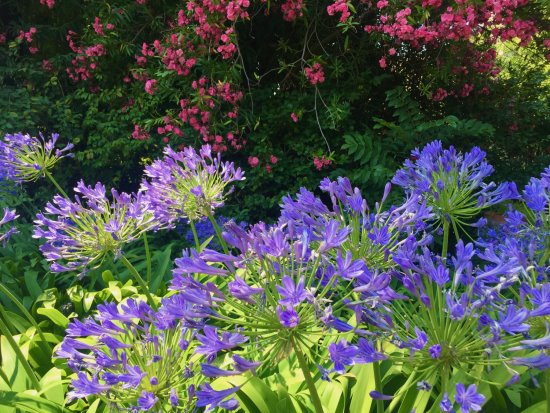 |
| The deer love agapanthus but know that oleander is poisonous. Photos Cynthia Brian |
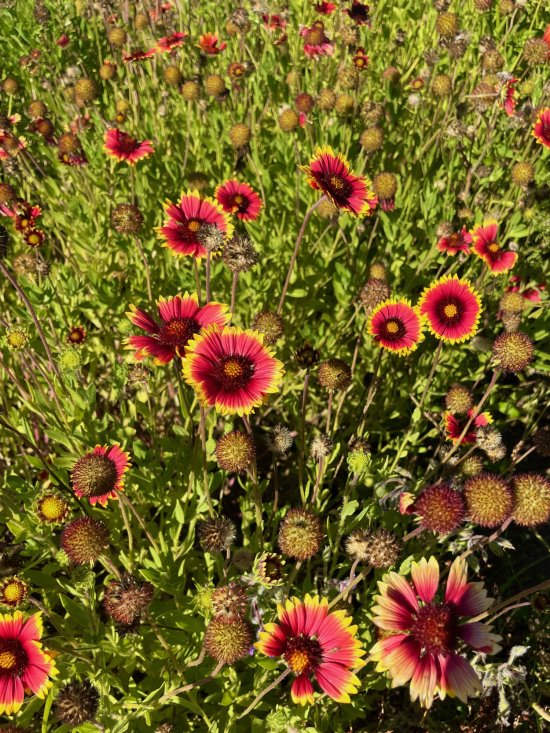 |
| Deer do not like blanket flowers. Photos Cynthia Brian |
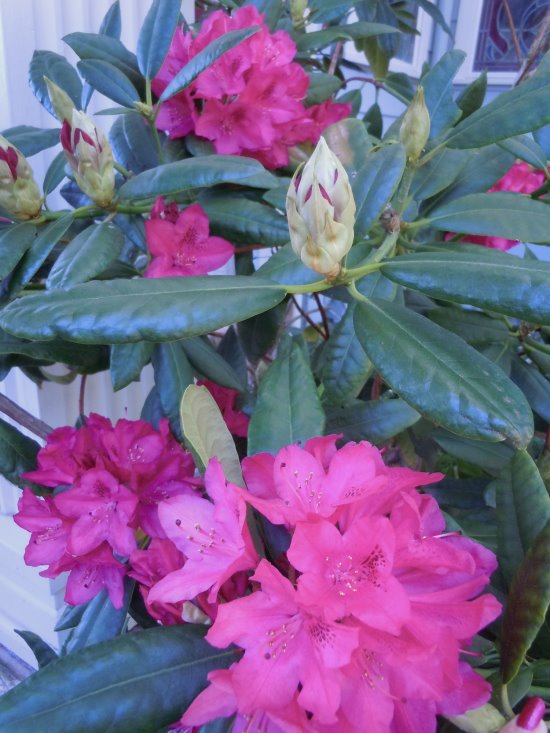 |
| Rhododendrons are delicious desserts for horned herbivores. Photos Cynthia Brian |
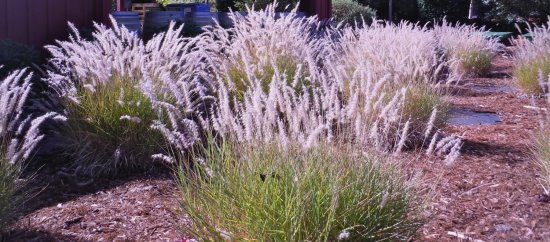 |
| Ornamental grasses do not appeal to the deer palate. Photos Cynthia Brian |
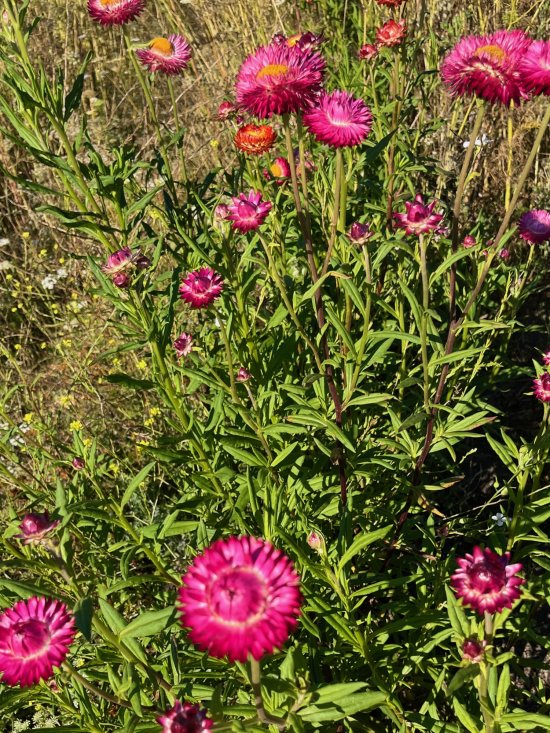 |
| Strawflowers, known as paper daisies, are
too rough and scratchy to entice deer diners. |
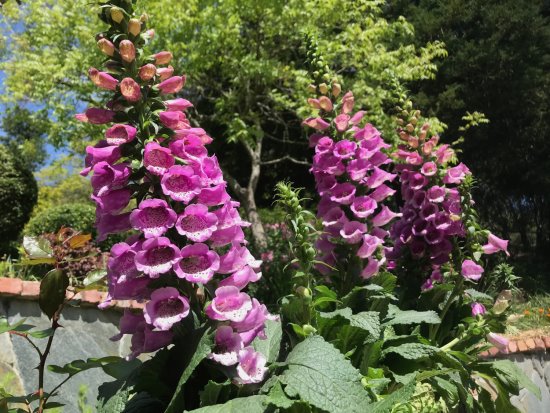 |
| Foxglove, AKA digitalis is toxic to deer.
|
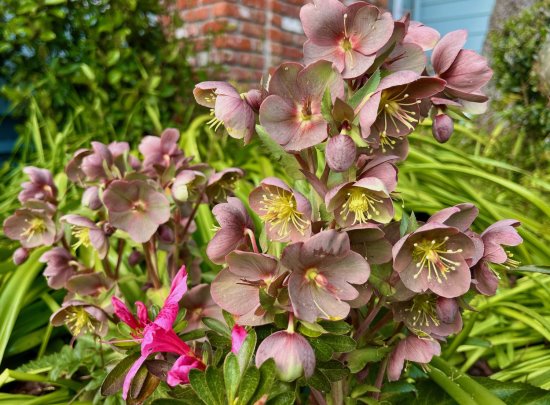 |
| The hellebores may protect the azalea in
the forefront from dining deer. |
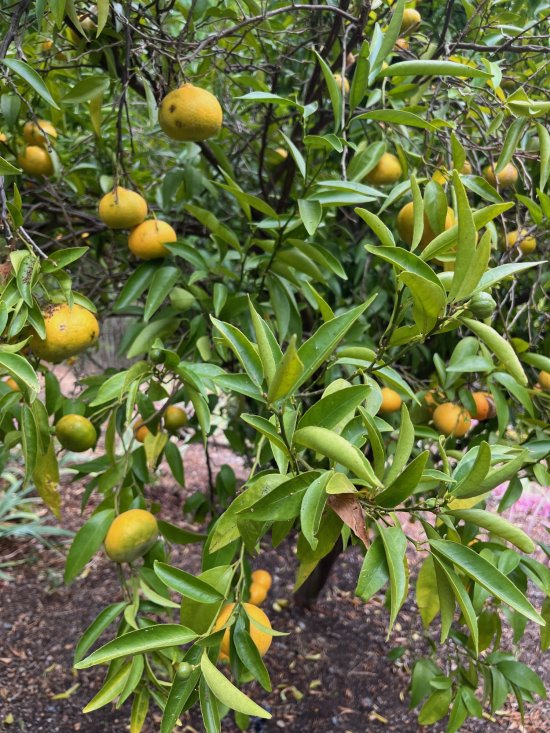 |
| Because of their waxy leaves and strong
fragrance, tangerines and all citrus trees are deer-resistant. |
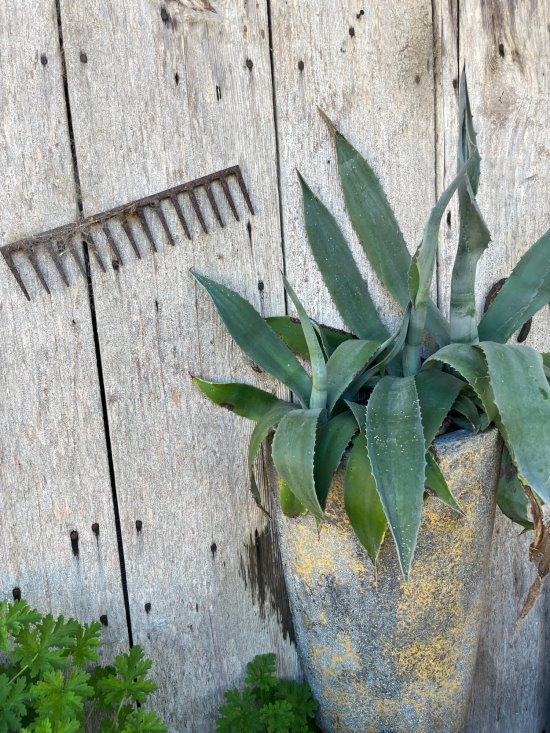 |
| Agaves deter deer, even in pots on sheds. |
 |
Cynthia Brian in the autumn garden.
For more gardening advice for all seasons, check out Growing with the Goddess Gardener at
https://www.CynthiaBrian.com/books. Raised in the vineyards of Napa County, Cynthia Brian is a New York Times best-selling author, actor, radio personality, speaker, media and writing coach as well as the Founder and Executive Director of Be the Star You Are!r 501 c3 which was just honored as the 2024 Nonprofit of the Year by the Moraga Chamber of Commerce. Tune into Cynthia's StarStyler Radio Broadcast at
www.StarStyleRadio.com. Her newest children's picture book, Books in the Barnyard: Oh Deer!, from the series, Stella Bella's Barnyard Adventures is available at
https://www.CynthiaBrian.com/online-store. Hire Cynthia for writing projects, garden consults, and inspirational lectures.
Cynthia@GoddessGardener.com |
|
|
|

